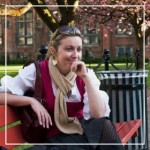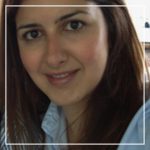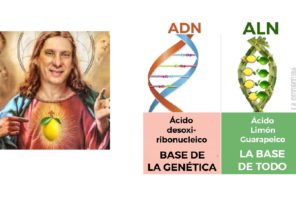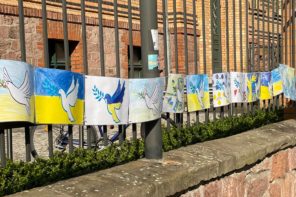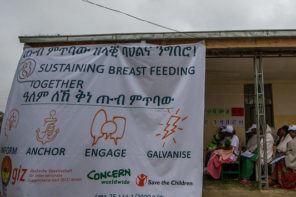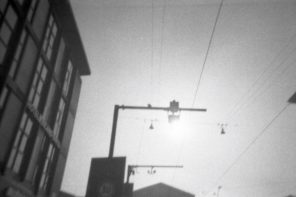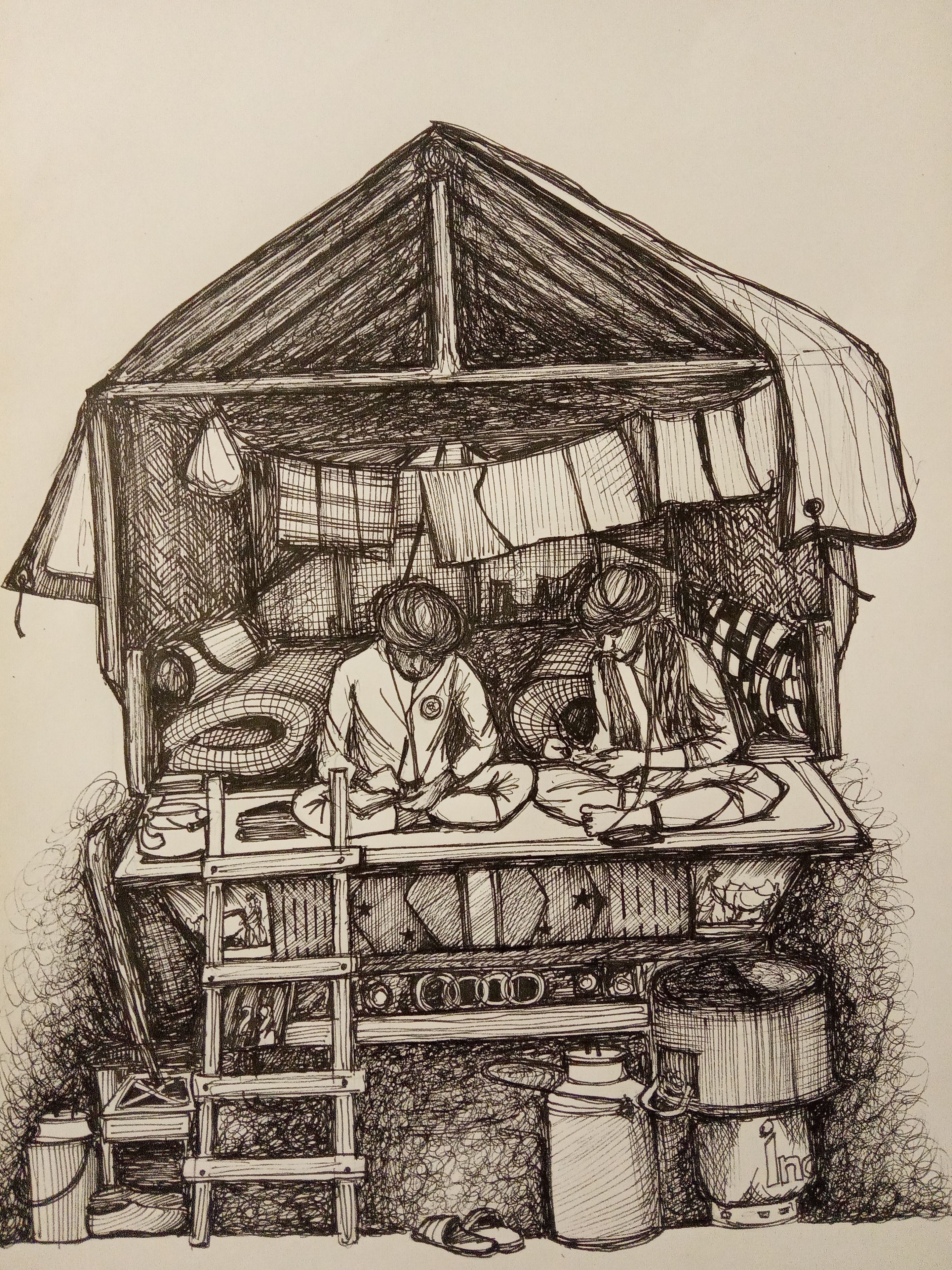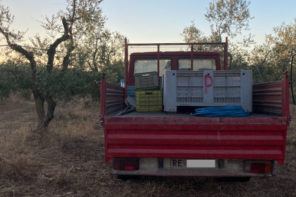The past is irrecoverable and the past is not past; the past is the resource for the future and the future is the redemption of the past; loss must be marked and it cannot be represented; loss fractures representation itself and loss precipitates its own modes of expression. (Butler 2003, 467)
Aydin Mehmet Ali (a Turkish Cypriot long time British National) writer stands at the top of a seminar room in a London University on a warm September’s day reading extracts from stories which are borne from loss. A group of early career academics sit in a circle entranced by the immediacy of Aydin’s writing, they are tired from a long day discussing loss but Aydin’s stories stir us into being. We hear snippets and extracts from across Aydin’s work, but one extract lingers. Aydin reads from a story called Forbidden Zone:
‘He dragged her into the night. A light elegant little thing she was. Like a bird. Young, barely in her mid-twenties. I heard him shout like a wounded animal, “Mariaaa… Mariaaa…” as they dragged her from the car. She was wearing a light blue sleeveless dress. You know, it was a hot summer… ’74. And she was beautifully tanned, with dark hair down to her shoulders…’ He pinches his lower lip and bites the tip of his thumbnail. He looks up, ‘You should’ve seen what he did to her […]. (2011: 197)’
This is a story of rape, of trauma, of suffering, but also one of loss. Aydin finishes reading, but her stories travel with us into the evening giving us a fuller realisation of the importance of the goals of our coming together. (Workshop reflection, 2016).
In September 2016, a group of academics from British and Turkish Universities gathered together in Camden, London to discuss the complexities of loss and displacement with a particular focus on Turkey. Funded by the British Council Newton Fund, the workshop was a collaboration between the Senator George J. Mitchell Institute for Global Peace, Security and Justice and Anthropology at Queen’s University Belfast and Bilgi University in Istanbul. The aim of the particular grant was to promote researcher links between the UK and Turkey and to contribute to research and skills training of early career researchers. The inspiration for this workshop came from the organisers’ (Ulrike Vieten QUB), Ilay Romain Ors (Bilgi), Evi Chatzipanagiotidou (QUB), Omer Turan (Bilgi) and Fiona Murphy (QUB)) research interests in the politics of mobility and global crisis-scapes of austerity, borders, climate change and conflict. The main motive for organising this workshop was a recognition amongst us of how a ‘politics of loss’ figures large within these intersecting crisis-scapes.
Inspired by such questions as how an analysis of ‘loss’ might lead to a better understanding of displacement in contemporary and historical perspectives, and thus connect to issues of social transformation and justice, we gathered together a range of participants working on these thematics through a cross-disciplinary lens. As Turkey has been at the centre of political processes and public debates around displacement, not least because of the flows of Syrian refugees to and through the country, it proved to be an important field of reflection on the politics of loss and displacement. While the majority of the workshop was dedicated to the Turkish context, on the final day, we also looked at work from South Africa, Poland and the UK. Over the next few days, our Allegra friends have given us the opportunity to bring some of our discussions to you, the Allegra readership. We do this in the spirit of bringing at least some of the learnings of an intimate workshop to a broader thinking public, and welcome any engagement on the topic.
The opening part of our workshop was dedicated to thinking through how the main thematics -loss and displacement- are currently being articulated in scholarly literature and beyond. How loss can be rendered understandable in both scholarly and applied contexts was key in this discussion. As ‘loss’ is one of the leitmotifs of the contemporary moment -particularly with respect to displacement- this is a particularly urgent task. Accessing loss as an ‘object’ of study but also as a method of analysis is a complex task, but one which we undertook with gravity for the duration of our collaborative workshop. In what are challenging times for Turkey and in spite of them, our discussions about the connections between loss and displacement engendered an ethic of responsibility, sustainability, renewal and hopefulness.
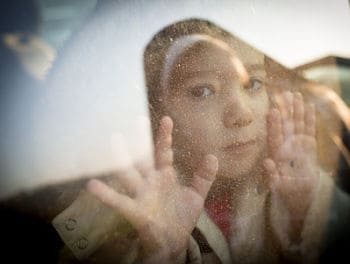
We agreed through our various case studies and analyses that understanding loss through what remains -the traces or remnants- is an important place to begin (see also Eng and Kazanjian 2003).
We also asked a number of questions such as: How can we understand the lived experience of loss in the context of displacement? What forms of agency and belonging have been engendered through the politicisation of loss? How is loss differently felt, imagined, negotiated, and engaged with in different displacement contexts and experiences? What implications does this have in both practical and theoretical terms? Indeed, after three days of engaged discussions and rich papers, we managed to combine forces analytically, intellectually and politically to move our interest in ‘loss’ from a signifying trope into a broader interdisciplinary ‘field’ of study through the diversity of our research..
We focused on migration and displacement as significant forces of social change and transformation historically and at present. Displacement was defined in the workshop in a broad sense, including conflict induced displacement across borders, internal displacement due to political, social and economic processes, displacement as a result of gentrification and spatial transformation.
However, displacement does not always involve movement or mobility.
It also relates to a state of being ‘out of place’ without having moved, when, for instance, communities dissolve or become attacked through particular state-building projects or exclusionary and silencing agendas.
The theoretical and empirical connections of ‘loss’ to the analysis of migration and displacement are not new and they have been constructed in a variety of thematic fields in and beyond Anthropology. For one, diasporas have been largely defined by ‘what is left behind’ and notions of nostalgia and longing, which constitute significant elements of loss. Conflict-induced displacement and its effects have also been analysed through related concepts. Talking about Cyprus, Navaro-Yashin (2009) focuses on melancholia (maraz in Turkish) as an affective condition of loss and mourning that Turkish Cypriots endure in the Northern part of the island. Maraz does not only become an emotive reaction to what was lost after Turkish Cypriots were displaced from their properties due to inter-communal conflict and war but also an emotive relation to ‘what remains’: the houses, land and objects Greek Cypriot refugees have left behind and with/in which Turkish Cypriot now have to live. More broadly,
‘loss’ becomes a lens to consider the individual and collective emotional, political, socio-cultural, economic and legal articulations and implications of mobility.
One of the aims of the workshop was therefore to trace the links between ‘loss’, migration and displacement that have emerged in different literatures and empirical contexts. We also asked whether current and new cycles of displacement can still be usefully understood through this prism. At the same time, we wanted to examine continuities between current conditions of displacement, such as the forced migration of Syrian refugees, with other periods and types of loss within and outside Turkey and the Ottoman Empire, including the losses experienced by Turkey’s Kurdish population. A major question that emerged was about whether we need to think newly about the types of losses that we are examining in these current contexts or to what extent we are talking about new losses altogether. We discussed examples and theories of how loss is produced and how its theorisations can help us not only to describe displacement and mobility but also to understand the political, social and cultural conditions in which they are (re)produced and experienced. Ultimately, this pushed us to debate how loss can help us connect current experiences of displacement not only to multiple pasts but also to potential -imagined or not- futures.

This week for the thematic week on loss, five of our workshop participants will be blogging about their work and their participation in the workshop. This is just a taste of what the larger essence of our workshop entailed but we are delighted to be able to share the creativity and passion with which our participants approach their work. Tomorrow’s blog is by Charlotte Hamid entitled ‘Loss in times of revolution and exile’. This is a contribution solidly anchored in the freshness of having just returned from what is important and challenging fieldwork. Charlotte shares the voices and stories of her Syrian interlocutors in a way which encourages reflection and action. The following day we hear from two of our participants: Ipek Demir in an eloquent reflection entitled ‘From self-identified ‘Turkish migrants’ to ‘Kurdish Diaspora’’ in London speaks about her intellectual engagement with loss through her career, and how it works in conjunction with a theory of ignorance to understand what Ipek calls the ‘de-turkification’ of Kurdish diasporic communities living in London. This reflection is followed by the very personal and emotive childhood tale by Mehmet Kurt. Entitled ‘A Tale of Two Stones’ Mehmet takes us on an emotionally charged journey into his past to reflect on how the vagaries of loss have shaped his life course as a member of the Kurdish minority in Turkey. Day four sees Samuel Hardy present us with the complexities of archaeology as a discipline alongside the employment difficulties archaeologists face in Turkey in a post entitled ‘Urban development and the resistance of archaeology’. Sam’s blog provides a critical reflection on how bound up archaeology in Turkey is with the vagaries of loss. Finally, we close with a reflection from Dalene Swanson who in her post entitled ‘No wall to lean on’ weaves together some of the critical aspects of the workshop by mapping the connections between crisis, loss and UBUNTU. Dalene closes this thematic week for us by reminding us that through all the complexities of understanding loss and displacement, we must indeed remember the urgent need to respond to such issues as compassionately and as humanely as possible. It is indeed this that we hoped for most in our bringing together a collective striving to understand loss and displacement.



